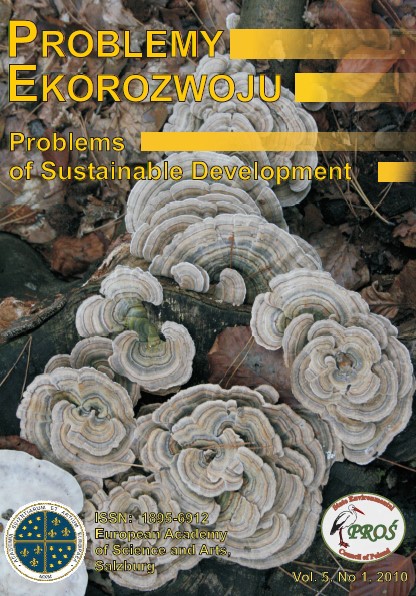Book Review: W. Sztumski, Quo ruis homo? Środowisko życia, czas, ludzie, 2008
Article Sidebar
Issue Vol. 5 No. 1 (2010)
-
Humanitarian Motives for Sustainable Developments in a Global Economy: An Essay
Paul T. Durbin9-13
-
A Curmudgeon’s Thoughts on Sustainability
David L. Russell15-22
-
Human Progress Towards Equitable Sustainable Development: A Philosophical Exploration
Victor Udo, Artur Pawłowski23-44
-
A Multifunctional Mosaic of Green Spaces in the Context of the Lower Silesia Region (Southern Poland) Sustainable Development
Anna Zaręba45-51
-
Model of Permanent Eco-chemical Education of Employees of Chemical Industry in the Function of Ecological Development
Stanko Cvjetićanin, Mirjana Segedinac, Jasna Adamov53-58
-
Decade of Education for Sustainable Development – Polish Challenges
Tadeusz Borys59-70
-
Some of the Theoretical Sustainable Development Aspects in the Reflection of the Christian Middle Ages Philosophy
Krzysztof Bochenek71-79
-
Polish and German Experiences in Planning and Implementation of Sustainable Development
Aleksandra Kuzior81-89
-
Biodiversity Conservation as One of Necessary Conditions of Ecodevelopment
Andrzej Urbisz91-94
-
Transformation of Cultural Landscapes in the Light of the Idea of Sustainable Development
Urszula Myga-Piątek95-108
-
A Cybernetic Approach to Sacrum – Profanum Relation
Lesław Michnowski109-138
-
Problems of Evaluation of Sound and Smell Discomfort in Sustainable Development
Sebastian Bernat139-144
-
Book Review: W. Sztumski, Quo ruis homo? Środowisko życia, czas, ludzie, 2008
Ignacy S. Fiut145-148
-
Book Review: L. Gawor, Szkice o cywilizacji, 2009
Jacek Lejman145-151
-
Letter to the Editorial Office: Sustainable Economy Based on Knowledge
Bazyli Poskrobko153-154
-
Communiques on Activities of the State Environmental Council of Poland
Tomasz Winnicki157-166
Archives
-
Vol. 7 No. 2
2012-07-02 14
-
Vol. 7 No. 1
2012-01-02 12
-
Vol. 6 No. 2
2011-07-01 19
-
Vol. 6 No. 1
2011-01-03 18
-
Vol. 5 No. 2
2010-07-01 21
-
Vol. 5 No. 1
2010-01-04 16
-
Vol. 4 No. 2
2009-07-01 19
-
Vol. 4 No. 1
2009-01-05 22
-
Vol. 3 No. 2
2008-07-01 19
-
Vol. 3 No. 1
2008-01-02 12
Main Article Content
Authors
Abstract
The concept of ecology of time presented by the author is in many respects close to the vision of man and society created by the authors of the critical theory of society of the Frankfurt School (including Max Horkheimer, Herbert Marcuse, and recently Jürgen Habermas). On the other hand, this analysis has many moments in common with the findings based on the theory of technological determinism, which were created in the 1960s and 1970s in Canada and the USA by Harold A. Innis, Marshall McLuhan, Derrick de Kerckhove, and Neil Postman, according to whose social development and the nature of interpersonal interactions are strictly determined by technological progress in communication, as a result of which the media become extensions of man, and he, without his own will, is connected to the global communication system as the so-called homo praticipans – homo participans, subconsciously taking over technological rationality from the media, and as a result of the acceleration of communication between people on a global scale, time and space implode and our world becomes a “global village” or a “global technopoly”.
Keywords:
Article Details
Abstract views: 43
License

This work is licensed under a Creative Commons Attribution-ShareAlike 4.0 International License.


